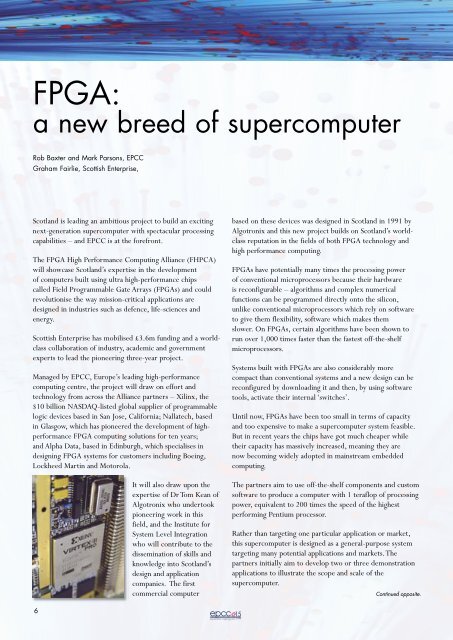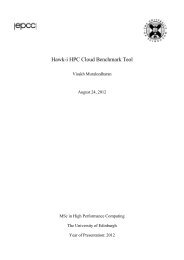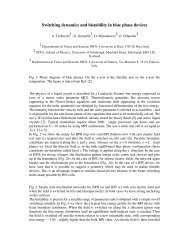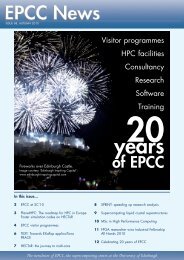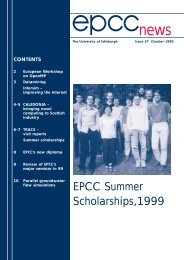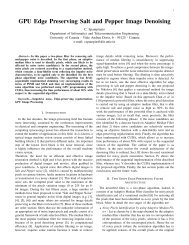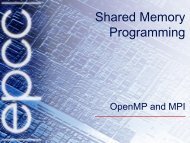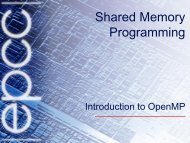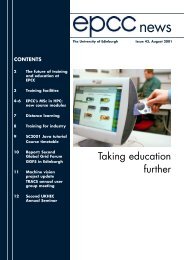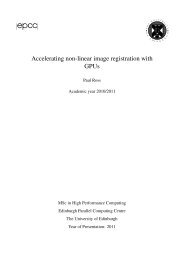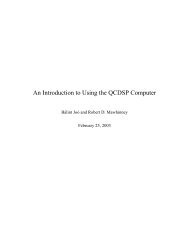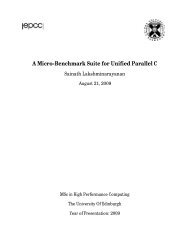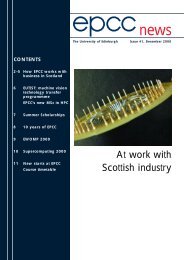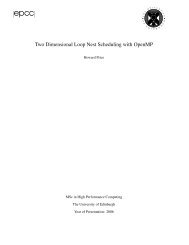Download PDF - EPCC - University of Edinburgh
Download PDF - EPCC - University of Edinburgh
Download PDF - EPCC - University of Edinburgh
You also want an ePaper? Increase the reach of your titles
YUMPU automatically turns print PDFs into web optimized ePapers that Google loves.
FOCUS: HARDWAREFPGA:a new breed <strong>of</strong> supercomputerRob Baxter and Mark Parsons, <strong>EPCC</strong>Graham Fairlie, Scottish Enterprise,Scotland is leading an ambitious project to build an excitingnext-generation supercomputer with spectacular processingcapabilities – and <strong>EPCC</strong> is at the forefront.The FPGA High Performance Computing Alliance (FHPCA)will showcase Scotland’s expertise in the development<strong>of</strong> computers built using ultra high-performance chipscalled Field Programmable Gate Arrays (FPGAs) and couldrevolutionise the way mission-critical applications aredesigned in industries such as defence, life-sciences andenergy.Scottish Enterprise has mobilised £3.6m funding and a worldclasscollaboration <strong>of</strong> industry, academic and governmentexperts to lead the pioneering three-year project.Managed by <strong>EPCC</strong>, Europe’s leading high-performancecomputing centre, the project will draw on effort andtechnology from across the Alliance partners – Xilinx, the$10 billion NASDAQ-listed global supplier <strong>of</strong> programmablelogic devices based in San Jose, California; Nallatech, basedin Glasgow, which has pioneered the development <strong>of</strong> highperformanceFPGA computing solutions for ten years;and Alpha Data, based in <strong>Edinburgh</strong>, which specialises indesigning FPGA systems for customers including Boeing,Lockheed Martin and Motorola.It will also draw upon theexpertise <strong>of</strong> Dr Tom Kean <strong>of</strong>Algotronix who undertookpioneering work in thisfield, and the Institute forSystem Level Integrationwho will contribute to thedissemination <strong>of</strong> skills andknowledge into Scotland’sdesign and applicationcompanies. The firstcommercial computerbased on these devices was designed in Scotland in 1991 byAlgotronix and this new project builds on Scotland’s worldclassreputation in the fields <strong>of</strong> both FPGA technology andhigh performance computing.FPGAs have potentially many times the processing power<strong>of</strong> conventional microprocessors because their hardwareis reconfigurable – algorithms and complex numericalfunctions can be programmed directly onto the silicon,unlike conventional microprocessors which rely on s<strong>of</strong>twareto give them flexibility, s<strong>of</strong>tware which makes themslower. On FPGAs, certain algorithms have been shown torun over 1,000 times faster than the fastest <strong>of</strong>f-the-shelfmicroprocessors.Systems built with FPGAs are also considerably morecompact than conventional systems and a new design can bereconfigured by downloading it and then, by using s<strong>of</strong>twaretools, activate their internal ‘switches’.Until now, FPGAs have been too small in terms <strong>of</strong> capacityand too expensive to make a supercomputer system feasible.But in recent years the chips have got much cheaper whiletheir capacity has massively increased, meaning they arenow becoming widely adopted in mainstream embeddedcomputing.The partners aim to use <strong>of</strong>f-the-shelf components and customs<strong>of</strong>tware to produce a computer with 1 teraflop <strong>of</strong> processingpower, equivalent to 200 times the speed <strong>of</strong> the highestperforming Pentium processor.Rather than targeting one particular application or market,this supercomputer is designed as a general-purpose systemtargeting many potential applications and markets. Thepartners initially aim to develop two or three demonstrationapplications to illustrate the scope and scale <strong>of</strong> thesupercomputer.Continued opposite.6


